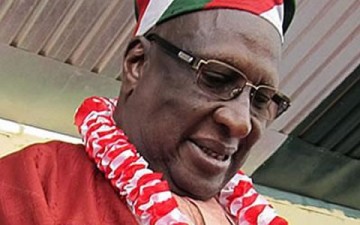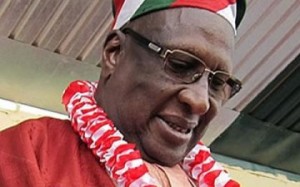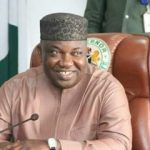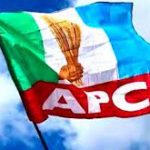Opinion: Whither PDP now that Tukur is gone?
Articles/Opinion, Latest Headlines Tuesday, January 21st, 2014
By Hamisu Abubakar
Prior to his predicted ouster last Thursday, erstwhile national chairman of the Peoples Democratic Party, Alhaji Bamanga Tukur, was seen–rightly or wrongly – as the clog in the wheel of the party’s progress. The all-powerful governors within the party never hid their distaste for his style of leadership and they never refrained from saying that it was anything but democratic. The plot for his ouster could have been as old as his tenure as national chairman, a position he assumed in March 2012. With time, the subtle sabotage turned into open threats to his leadership; with five of them eventually making good that threat by quitting to join the opposition All Progressives Congress.
Poor Bamanga! The party had never fallen to that low, and no national chairman before him had witnessed such magnitude of rebellion, right from the outset of his leadership. The defection of the five governors, along with 37 members of the National Assembly, which still threatens the ruling party’s dominance in the lower chamber, became the anti-climax in Tukur’s tenure. With the intrigues increasingly tightening around his neck, he was forced to resign at last Thursday’s crunch meeting of the PDP National Executive Committee, thus paving way to the emergence, last Monday, of former governor of Bauch state, Alhaji Adamu Muazu as the party’s interim national chairman.
The question is, now that Bamanga Tukur is gone, where does the party go from here? To interrogate this issue, one must properly identify the origin of Tukur’s troubles. One thing that comes clear is that it all started and ended with the governors who largely call the shots in the party. This must be the starting point for the new Chairman, Adamu Muazu, who was favoured to take up the party leadership because, according to analysts, of his unquestionable loyalty to the party and his ability to reconcile the various tendencies that are tearing the party in different directions.
Muazu must, therefore, learn from the mistakes of Tukur who never really enjoyed a warm relationship with the party governors due to what many believed were his personal interests. The forced enthronement or recognition of unpopular party executives in some states did a great harm to Tukur’s relationship with governors. In his home state of Adamawa, he had enthroned the Mijinyawa Kaugama-led state executive, contrary to laid down rules. His quarrel with Olagunsoye Oyinlola did not also sit well with the governors who felt he was overbearing on Oyinlola and Adamawa governor, Nyako, both of whom were regarded as their own.
This lukewarm relationship was obvious from the outset. In his first major outing with them – a meeting he called at the party’s Legacy House in Abuja- the relationship had soured so much that only five governors attended. A similar scenario also played out when only three (Orji of Abia, Yuguda of Bauchi and the late Yakowa of Kaduna) were present at the launch of his biography, the “Global Villager” to mark his 77th birthday anniversary. The boycott of the party’s one year celebration of its National Working Committee at the International Conference Centre, Abuja, which attracted only 2 governors, brought matters to a head and clearly raised the alarm.
Muazu’s coming is therefore apt, and it is imperative that he institutes a genuine reconciliation within the party’s rank and file. Except the reconciliation efforts by the Board of Trustees led by Chief Tony Anenih and President Goodluck Jonathan, not much has been done in resolving the crises in almost all the state chapters of the party, and Muazu must realize from day one, the crucial need to get the state chapters working with him. With the fortunes of the party increasingly appearing to be dwindling, the new leadership must make efforts to re-position PDP for future elections, more importantly the forthcoming governorship elections in Ekiti and Osun States.
Some analysts are already predicting that Tukur’s departure will bring to an end, the squabbles that have engulfed the party in recent times. President Jonathan and the PDP governors have already commenced moves to encourage the five defected governors to return to the party; while Benue state governor, Gabriel Suswan, was a bit cautious in predicting the outcome of their efforts, Niger State Governor, Babangida Aliyu was emphatic that his colleagues, who defected to the All Progressives Congress (APC), would return to PDP. It may not be so dramatic. This optimism may have even excited Jonathan into endorsing Tukur’s departure, but that swift reconciliation, as desirable as it may be for him, may indeed be far-fetched because a lot of water have passed under the bridge, in a manner of speaking.
How much success Jonathan and the party leadership will make of this effort remains to be seen, more so when a few of the defectors have already openly ruled themselves out of such consideration? No doubt, it will take more than the departure of Tukur forGovernors Rabiu Kwankwaso (Kano), Aliyu Wamakko (Sokoto), Ahmed Abdulfatah (Kwara), Murtala Nyako (Adamawa) and Rotimi Amaechi (Rivers) who alleged impunity and lack of democracy in the PDP, to return. While the like of Senator Bukola Saraki, Governor Murtala Nyako and Usman Wamakko have ruled themselves out of such prediction, there are improved chances, however, that the like of Governor Sule Lamido and Muazu Babangida Aliyu, both of whom have hobnobbed with the rebels in the past would find better accommodation within the PDP.
Muazu, should borrow from the experience of the party’s chairman, Board of Trustees, Chief Anenih, who has done a lot in recent times to stem the tide of disaffection. Anenih who had mounted a single-minded effort to keep the aggrieved governors within the fold, has proved that it is really possible to assuage their grievances and once again get the party to speak with one voice. Since some of them have made their complaints open, a situation that makes appeasement possible, it is important that they are not swept under the carpet. This is important as the party must seek to build from what is on ground rather than seeking the return of certain politicians whose weights do not count for much beyond the positions they were fortunate to occupy.
The PDP had never before hung on such a precarious situation, and Muazu’s task is to start the process of pulling the party back from the precipice. But he needs the support of all concerned stakeholders to reverse the current worrisome state of the party.
Abubakar sent this piece via hamisuabubakar2015@yahoo.com
Related Posts
Short URL: https://www.africanexaminer.com/?p=7480























